Podcast Topic: Food, Psychology & Neuroscience
The Leading Voices in Food
Podcast Topic: Food, Psychology & Neuroscience
 E259: Your state of the science on weight loss drugs
E259: Your state of the science on weight loss drugs
January 8, 2025
About two years ago, we released a podcast with Dr. Thomas Wadden of the University of Pennsylvania describing work on a new generation of medications to treat diabetes and obesity. They were really taking the field by storm. Since then, much more is known since many additional studies have been published and so many people have been using the drugs. So many, in fact, the market value of the Danish company, Novo Nordisk, one of the two major companies selling the drugs, has gone up. It is now greater than the entire budget of the country of Denmark. This single company is responsible for about half of Denmark’s economic expansion this year. So, a lot of people are now taking the drugs and this is a great time for an update on the drugs. And we’re fortunate to have two of the world’s leading experts join us: Dr. Wadden, Professor of Psychology and Psychiatry at the University of Pennsylvania School of Medicine and the inaugural Albert J. Stunkard Professor of Psychiatry at Penn. Joining us as well as Dr. Robert Kushner, a physician and professor of medicine at Northwestern University and a pioneer in testing treatments for obesity.
Related podcasts: Diet & Nutrition | Food, Psychology & Neuroscience | Obesity | Weight Stigma |
 E258: Do ‘market driven epidemics’ drive your food choices?
E258: Do ‘market driven epidemics’ drive your food choices?
December 18, 2024
For much of history, the word ‘epidemic’ applied to infectious diseases. Large numbers of cases of disease caused by organisms such as bacteria and viruses that spread through water, air, or other means, sometimes transmitted from person to person, or back and forth between people and animals. Then came epidemics of chronic diseases such as obesity, diabetes, heart disease – diseases occurring in very large numbers and created not by infectious agents, but by drivers in our day to day lives, such as a bad food environment. A new paper was just published in the PLOS global health literature that I found fascinating. It focuses on another use of the concept of epidemics: market driven epidemics. Let’s find out what these are and find out a little bit more about their implications for our health and wellbeing. Our guests today are two of the authors of that paper. Dr. Jonathan Quick is a physician and expert on global health and epidemics. He is an adjunct professor at Duke University’s Global Health Institute. Eszter Rimanyi joins us as well. She works on chronic disease and addiction epidemiology at Duke university.
Related podcasts: Addiction & Food | Advocacy & Food | Food Industry Behavior & Marketing | Food Safety & Food Defense | Food, Psychology & Neuroscience |
 E245: Menus of Change Collaborative – shaping university student eating habits and careers
E245: Menus of Change Collaborative – shaping university student eating habits and careers
September 9, 2024
When you hear university dining, you likely have images in your mind of college students with trays and hand waiting in a line for a meal in a dining hall. You may even think of a food court or a trendy food hall in the cool part of town. But there is so much more happening behind the scenes. Today we will learn about Menus of Change University Research Collaborative, MCURC for short, which is a nationwide network of colleges and universities using campus dining halls as living laboratories for behavior change. The collaborative’s goals are to move people towards healthier, more sustainable and delicious foods using evidence-based research, education and innovation. Our guest today is the collaborative’s co-founder and co-director, Stanford University’s Sophie Egan.
Related podcasts: Chefs & Food Writers | Diet & Nutrition | Food Industry Behavior & Marketing | Food, Psychology & Neuroscience | School Meals |
 E240: Do food companies manipulate us with sports sponsorships?
E240: Do food companies manipulate us with sports sponsorships?
July 30, 2024
Food companies market their products in a great many ways. Connecting their brands and products to sports and major sporting events is one such way and is drawing a lot of attention now. The reason is that the Summer Olympics are underway, which trains attention on the relationship between the International Olympic Committee and its longest running sponsor. Coca Cola has been a sponsor of every Olympics since 1928. So, it’s intuitively obvious why sponsorships would be important to the Olympics because They get lots of money in the door and it’s reliable.
It’s been happening since 1928. But let’s talk about why this relationship is so important to companies, Coca Cola in particular, and what the public health impact of that might be. Today’s guest, Dr. Marie Bragg, has contributed some of the key studies on this topic. She is Assistant professor at the NYU Grossman School of Medicine, where she also serves as director of diversity initiatives. She holds an affiliate faculty appointment in the marketing department at the NYU Stern School of business; directs the NYU food environment and policy research coalition; and she’s also a Food Leaders Fellow at the Aspen Institute.
 E236: Why we need a new food labeling system
E236: Why we need a new food labeling system
April 29, 2024
The first nutrition labels mandated by the Food and Drug Administration appeared on food packages in 1994. A key update occurred in 2016, informed by new science on the link between diet and chronic disease. Along the way, things like trans fats and added sugars were required, but all along, the labels have been laden with numbers and appear on the back or side of packages. There has long been interest in more succinct and consumer-friendly labeling systems that might appear on the front of packages. Such systems exist outside the US, but for political reasons and lobbying by the food industry, have been blocked in the United States. There’s new hope, however, described in a recent opinion piece by Christina Roberto, Alyssa Moran, and Kelly Brownell in the Washington Post. Today, we welcome Dr. Christina Roberto, lead author of that piece. She is the Mitchell J. Blutt and Margot Krody Blutt Presidential Associate Professor of Health Policy in the School of Medicine at the University of Pennsylvania.
Related podcasts: Diet & Nutrition | Food Industry Behavior & Marketing | Food Policy | Food, Psychology & Neuroscience |
 E217: When babies inherit Mom’s trauma-affected gut microbiome
E217: When babies inherit Mom’s trauma-affected gut microbiome
October 12, 2023
A diversity of bacteria and microorganisms making up the gut microbiome supports both our physical and our mental health. Research has shown that stress and trauma can negatively impact the microbiome. But a recent study took that finding to a new level. This was a study published in the Proceedings of the National Academy of Sciences. Scientists now see inflammation-related microbiomes in babies born to women who experienced mistreatment or adversity during their own childhood. These microbiomes predispose children to physical and mental health problems. We’ll talk today with the co-author of that paper, Fran Querdasi, from the University of California, Los Angeles.
Related podcasts: Child Development & Nutrition | Diet & Nutrition | Food, Psychology & Neuroscience | Microbiome |
 E209: Microbiome Research and a Vision of Precision Medicine
E209: Microbiome Research and a Vision of Precision Medicine
July 13, 2023
The microbiome is fascinating and how diet affects it is something we all want to know. The work of today’s guest, Dr. Abigail Johnson, tells us a lot. She’s on the faculty and the School of Public Health at the University of Minnesota and is an expert on diet and the microbiome and their impact on health and disease.
Related podcasts: Diet & Nutrition | Food, Psychology & Neuroscience | Microbiome |
 E206: Results from a National Household Food Waste Survey
E206: Results from a National Household Food Waste Survey
June 6, 2023
No one actually wants to waste food, right? And yet, a new national study on food waste at home shows we’ve become more wasteful recently. US families self-reported a 280% increase in discarded food between early 2021 and early 2022. What’s more, households tossed out more food during weeks they ate out. Today, we will explore results from a national tracking study published in the Journal of the Agricultural and Applied Economics Association. Our guests to help us learn more about this topic are economist Kathryn Bender. Katherine studies consumer behavior and food waste at the University of Delaware. We also have Brian Roe, who is an agricultural economist from the Ohio State University. Brian’s research focuses on food waste and consumer economics.
Related podcasts: Climate Change, Environment & Food | Food Waste & Implications | Food, Psychology & Neuroscience |
 E185: How and why do households waste food?
E185: How and why do households waste food?
November 2, 2022
Did you know that each year the average American family of four loses $1,500 to uneaten food? What’s more, consumer food waste is the largest category of waste sent to landfills. When food is wasted, so is the land, water, labor, and energy that were used in producing, processing, transporting, preparing, storing and disposing of the discarded food. So why does household food waste and plate waste happen? We have two guests today to help us explore this topic. First, Dr. Roni Neff from Johns Hopkins University. Roni studies wasted food, food system resilience, and climate change through a public health lens. Second, we have Dr. Brian Roe from the Ohio State University. Brian focuses on food waste and behavioral and consumer economics.
Related podcasts: Climate Change, Environment & Food | Food Waste & Implications | Food, Psychology & Neuroscience |
 E181: UK Stands Firm in Ruling Against Kellogg Cereals
E181: UK Stands Firm in Ruling Against Kellogg Cereals
September 21, 2022
In July, 2022 food giant Kellogg lost a court challenge of the United Kingdom’s high sugar cereal rule. The multinational food company had argued that the UK government’s inclusion of their serials among and I quote, less healthy foods is unfair because it doesn’t take into account the milk that is usually added to the cereals. The UK court dismissed the claim and is enforcing regulations, is limiting the promotion of foods that are high in fat, salt and sugar in UK supermarkets as part of their efforts to curb obesity. Here to speak with us today about the implications of this ruling is Anna Taylor, executive director of The Food Foundation in London.
Related podcasts: Advocacy & Food | Childhood Obesity | Diet & Nutrition | Food Industry Behavior & Marketing | Food Policy | Food, Psychology & Neuroscience | International Food & Ag Policy |

 E259: Your state of the science on weight loss drugs
E259: Your state of the science on weight loss drugs E258: Do ‘market driven epidemics’ drive your food choices?
E258: Do ‘market driven epidemics’ drive your food choices?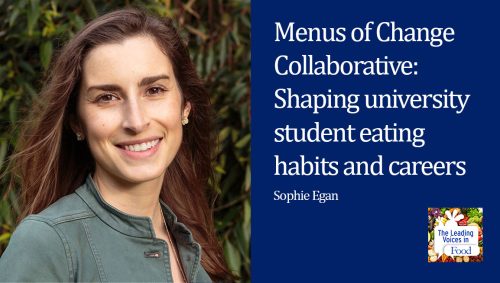 E245: Menus of Change Collaborative – shaping university student eating habits and careers
E245: Menus of Change Collaborative – shaping university student eating habits and careers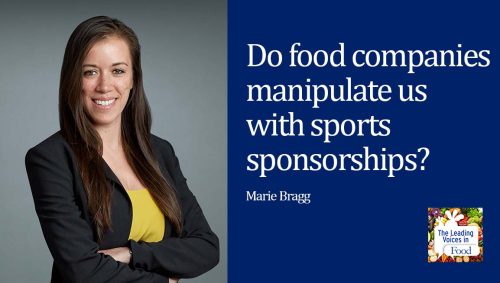 E240: Do food companies manipulate us with sports sponsorships?
E240: Do food companies manipulate us with sports sponsorships?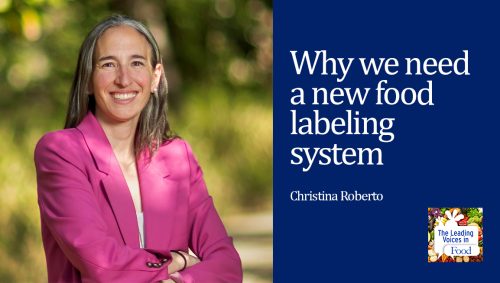 E236: Why we need a new food labeling system
E236: Why we need a new food labeling system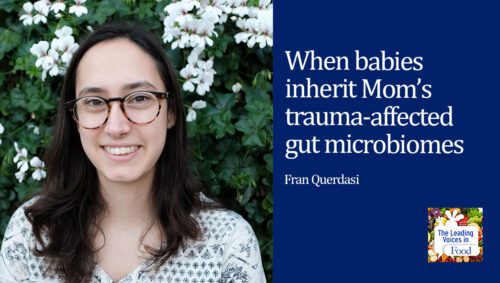 E217: When babies inherit Mom’s trauma-affected gut microbiome
E217: When babies inherit Mom’s trauma-affected gut microbiome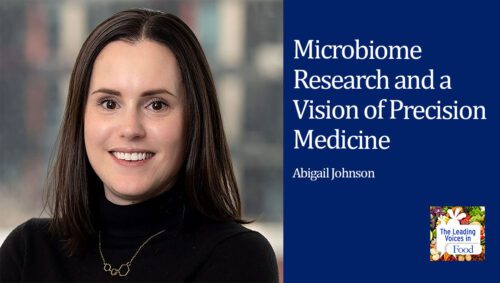 E209: Microbiome Research and a Vision of Precision Medicine
E209: Microbiome Research and a Vision of Precision Medicine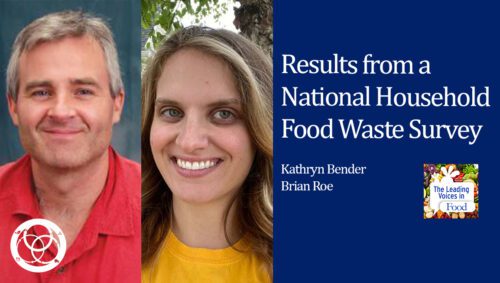 E206: Results from a National Household Food Waste Survey
E206: Results from a National Household Food Waste Survey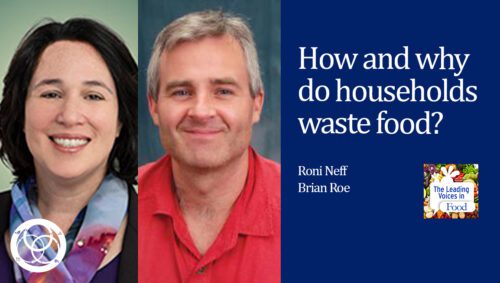 E185: How and why do households waste food?
E185: How and why do households waste food?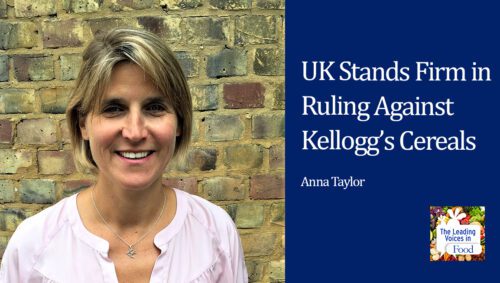 E181: UK Stands Firm in Ruling Against Kellogg Cereals
E181: UK Stands Firm in Ruling Against Kellogg Cereals